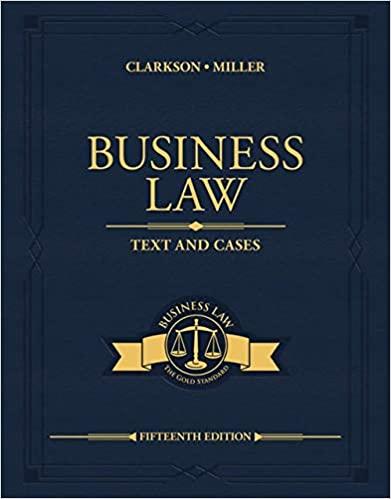Question
Question 1: Which of the following is a role of the Executive Branch? a) To make laws. b) To enforce laws. c) To interpret laws.
Question 1: Which of the following is a role of the Executive Branch?
a) To make laws.
b) To enforce laws.
c) To interpret laws.
d) None of the above
Question 2: Which of the following is not an enumerated power of the President?
a) To take care that the laws be faithfully executed.
b) To issue pardons.
c) To declare war.
d) To veto bills.
Question 3: When is the President's power at its weakest under Justice Jackson's categorical approach in Youngstown Sheet & Tube Co. v. Sawyer?
a) When Congress has not addressed the Presidential action at issue.
b) When Congress has authorized the Presidential action at issue.
c) When Congress has disapproved of the Presidential action at issue.
d) When Congress vetoes the Presidential action at issue
Question 4: In Youngstown Sheet & Tube Co. v. Sawyer, the Court ruled that
a) The President had the authority to take over the nation's steel mills because Congress authorized it.
b) The President had the authority to take over the nation's steel mills under its inherent powers.
c) The President did not have the authority to take over the nation's steel mills because congressional will on the matter was unclear.
d) The President did not have the authority to take over the nation's steel mills because it was inconsistent with congressional will on the matter
Question 5: Which of the following is not an executive power regarding foreign affairs?
a) Regulating commerce.
b) Entering into executive agreements.
c) Receiving ambassadors.
d) All of the above.
Question 6: In United States v. Curtiss-Wright, the Court ruled that
a) The President did not have the authority to enact an arms embargo.
b) The President has no inherent powers.
c) The President has broad foreign powers that included the power to enact the arms embargo.
d) The President's foreign powers are limited to what Congress authorizes.
Question 7: The President issues an Executive Order nullifying all claims against a foreign country and all attachments on property and assets owned by that country. The order is
a) Constitutional under the President's inherent powers.
b) Constitutional if authorized by Congress.
c) Unconstitutional unless it is approved by the Senate.
d) Unconstitutional as it is inconsistent with congressional will.
Question 8: The President issues an Executive Order removing all due process rights for enemy combatants captured on American soil. The Order is
a) Constitutional under the President's inherent powers.
b) Constitutional if authorized by Congress.
c) Unconstitutional unless it is approved by the Senate.
d) Unconstitutional as it is inconsistent with Constitutional requirements.
Question 9: Congress passes a law allowing the President to enter into treaties with foreign countries without the approval of the Senate. The law is
a) Constitutional because the President has inherent powers to enter into treaties.
b) Constitutional because Congress has broad powers in foreign affairs.
c) Unconstitutional because the Constitution requires the Senate to approve treaties.
d) Unconstitutional because Congress cannot pass laws regarding foreign affairs.
Step by Step Solution
There are 3 Steps involved in it
Step: 1

Get Instant Access to Expert-Tailored Solutions
See step-by-step solutions with expert insights and AI powered tools for academic success
Step: 2

Step: 3

Ace Your Homework with AI
Get the answers you need in no time with our AI-driven, step-by-step assistance
Get Started


